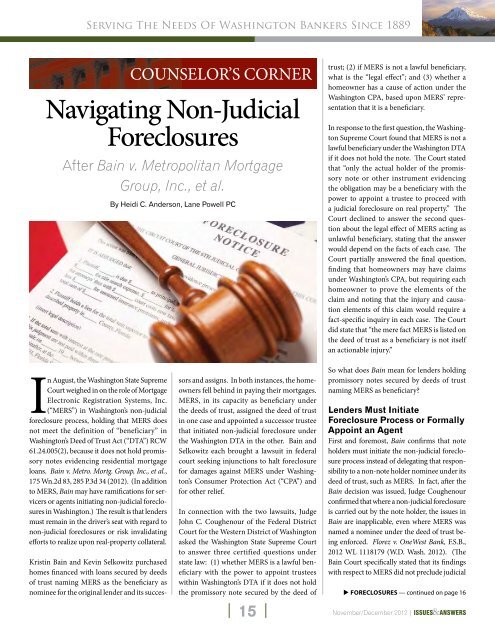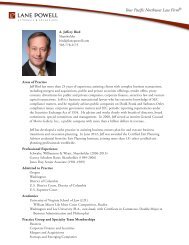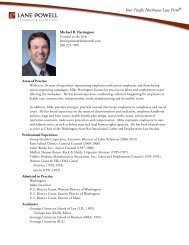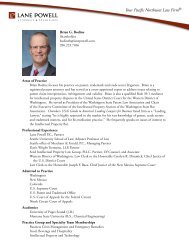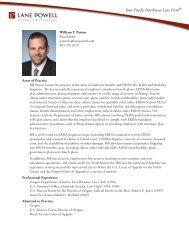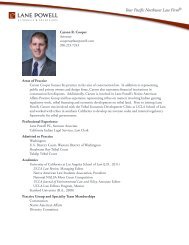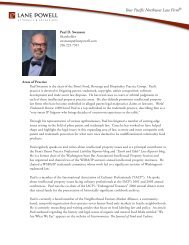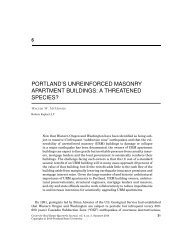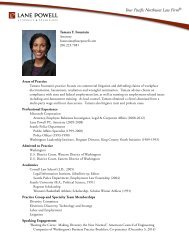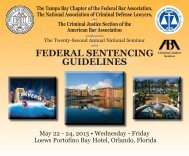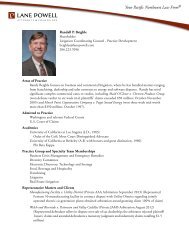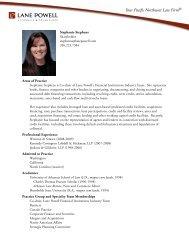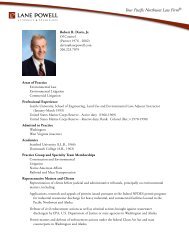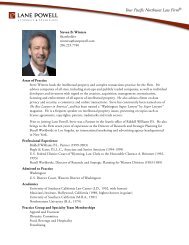Bain v. Metropolitan Mortgage Group, Inc., et al. - Lane Powell PC
Bain v. Metropolitan Mortgage Group, Inc., et al. - Lane Powell PC
Bain v. Metropolitan Mortgage Group, Inc., et al. - Lane Powell PC
You also want an ePaper? Increase the reach of your titles
YUMPU automatically turns print PDFs into web optimized ePapers that Google loves.
Serving The Needs Of Washington Bankers Since 1889<br />
Navigating Non-Judici<strong>al</strong><br />
Foreclosures<br />
After <strong>Bain</strong> v. <strong>M<strong>et</strong>ropolitan</strong> <strong>Mortgage</strong><br />
<strong>Group</strong>, <strong>Inc</strong>., <strong>et</strong> <strong>al</strong>.<br />
In August, the Washington State Supreme<br />
Court weighed in on the role of <strong>Mortgage</strong><br />
Electronic Registration Systems, <strong>Inc</strong>.<br />
(“MERS”) in Washington’s non-judici<strong>al</strong><br />
foreclosure process, holding that MERS does<br />
not me<strong>et</strong> the definition of “beneficiary” in<br />
Washington’s Deed of Trust Act (“DTA”) RCW<br />
61.24.005(2), because it does not hold promissory<br />
notes evidencing residenti<strong>al</strong> mortgage<br />
loans. <strong>Bain</strong> v. M<strong>et</strong>ro. Mortg. <strong>Group</strong>, <strong>Inc</strong>., <strong>et</strong> <strong>al</strong>.,<br />
175 Wn.2d 83, 285 P.3d 34 (2012). (In addition<br />
to MERS, <strong>Bain</strong> may have ramifi cations for servicers<br />
or agents initiating non-judici<strong>al</strong> foreclosures<br />
in Washington.) Th e result is that lenders<br />
must remain in the driver’s seat with regard to<br />
non-judici<strong>al</strong> foreclosures or risk inv<strong>al</strong>idating<br />
eff orts to re<strong>al</strong>ize upon re<strong>al</strong>-property collater<strong>al</strong>.<br />
Kristin <strong>Bain</strong> and Kevin Selkowitz purchased<br />
homes fi nanced with loans secured by deeds<br />
of trust naming MERS as the benefi ciary as<br />
nominee for the origin<strong>al</strong> lender and its succes-<br />
COUNSELOR’S CORNER<br />
By Heidi C. Anderson, <strong>Lane</strong> <strong>Powell</strong> <strong>PC</strong><br />
sors and assigns. In both instances, the homeowners<br />
fell behind in paying their mortgages.<br />
MERS, in its capacity as benefi ciary under<br />
the deeds of trust, assigned the deed of trust<br />
in one case and appointed a successor trustee<br />
that initiated non-judici<strong>al</strong> foreclosure under<br />
the Washington DTA in the other. <strong>Bain</strong> and<br />
Selkowitz each brought a lawsuit in feder<strong>al</strong><br />
court seeking injunctions to h<strong>al</strong>t foreclosure<br />
for damages against MERS under Washington’s<br />
Consumer Protection Act (“CPA”) and<br />
for other relief.<br />
In connection with the two lawsuits, Judge<br />
John C. Coughenour of the Feder<strong>al</strong> District<br />
Court for the Western District of Washington<br />
asked the Washington State Supreme Court<br />
to answer three certified questions under<br />
state law: (1) wh<strong>et</strong>her MERS is a lawful benefi<br />
ciary with the power to appoint trustees<br />
within Washington’s DTA if it does not hold<br />
the promissory note secured by the deed of<br />
15<br />
trust; (2) if MERS is not a lawful benefi ciary,<br />
what is the “leg<strong>al</strong> eff ect”; and (3) wh<strong>et</strong>her a<br />
homeowner has a cause of action under the<br />
Washington CPA, based upon MERS’ representation<br />
that it is a benefi ciary.<br />
In response to the fi rst question, the Washington<br />
Supreme Court found that MERS is not a<br />
lawful benefi ciary under the Washington DTA<br />
if it does not hold the note. Th e Court stated<br />
that “only the actu<strong>al</strong> holder of the promissory<br />
note or other instrument evidencing<br />
the obligation may be a benefi ciary with the<br />
power to appoint a trustee to proceed with<br />
a judici<strong>al</strong> foreclosure on re<strong>al</strong> property.” Th e<br />
Court declined to answer the second question<br />
about the leg<strong>al</strong> eff ect of MERS acting as<br />
unlawful benefi ciary, stating that the answer<br />
would depend on the facts of each case. Th e<br />
Court parti<strong>al</strong>ly answered the fi n<strong>al</strong> question,<br />
fi nding that homeowners may have claims<br />
under Washington’s CPA, but requiring each<br />
homeowner to prove the elements of the<br />
claim and noting that the injury and causation<br />
elements of this claim would require a<br />
fact-specifi c inquiry in each case. Th e Court<br />
did state that “the mere fact MERS is listed on<br />
the deed of trust as a benefi ciary is not itself<br />
an actionable injury.”<br />
So what does <strong>Bain</strong> mean for lenders holding<br />
promissory notes secured by deeds of trust<br />
naming MERS as benefi ciary?<br />
Lenders Must Initiate<br />
Foreclosure Process or Form<strong>al</strong>ly<br />
Appoint an Agent<br />
First and foremost, <strong>Bain</strong> confi rms that note<br />
holders must initiate the non-judici<strong>al</strong> foreclosure<br />
process instead of delegating that responsibility<br />
to a non-note holder nominee under its<br />
deed of trust, such as MERS. In fact, aft er the<br />
<strong>Bain</strong> decision was issued, Judge Coughenour<br />
confi rmed that where a non-judici<strong>al</strong> foreclosure<br />
is carried out by the note holder, the issues in<br />
<strong>Bain</strong> are inapplicable, even where MERS was<br />
named a nominee under the deed of trust being<br />
enforced. Florez v. OneWest Bank, F.S.B.,<br />
2012 WL 1118179 (W.D. Wash. 2012). (Th e<br />
<strong>Bain</strong> Court specifi c<strong>al</strong>ly stated that its fi ndings<br />
with respect to MERS did not preclude judici<strong>al</strong><br />
� FORECLOSURES — continued on page 16<br />
November/December 2012 |
Serving The Needs Of Washington Bankers Since 1889<br />
� FORECLOSURES — continued from page 15<br />
foreclosure.) Accordingly, it is vit<strong>al</strong> that the holder of the note at issue take<br />
steps to appoint a successor trustee before initiating non-judici<strong>al</strong> foreclosure<br />
proceedings, rather than relying on a trustee appointed by MERS.<br />
Alternatively, lenders have the option of utilizing an agent to drive the<br />
non-judici<strong>al</strong> foreclosure process. Notably, <strong>Bain</strong> does not preclude the<br />
use of agents to represent a lender’s interests with respect to a promissory<br />
note, including initiating the foreclosure process. Aft er recognizing that<br />
“Washington law, and the deed of trust act itself, approves of the use of<br />
agents[,]” the Court explicitly stated: “nothing in this opinion should<br />
be construed to suggest an agent cannot represent the holder of a note.”<br />
However, to the extent a note holder decides to utilize an agent for<br />
purposes of initiating a non-judici<strong>al</strong> foreclosure, it would be prudent<br />
to: (1) form<strong>al</strong>ly document the agency relationship, and (2) require that<br />
<strong>al</strong>l documents issued by the agent in connection with the non-judici<strong>al</strong><br />
foreclosure specify its role as an agent for the note holder.<br />
Heidi C. Anderson concentrates her practice in the financi<strong>al</strong><br />
institution and commerci<strong>al</strong> finance industries, with an emphasis<br />
on bankruptcy and commerci<strong>al</strong> litigation. Heidi can be reached at<br />
andersonh@lanepowell.com or 206.223.2550.<br />
www.wabankers.com 16


